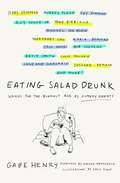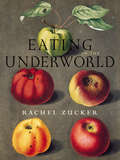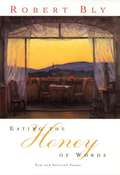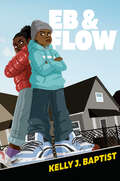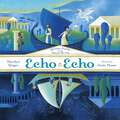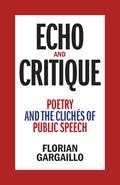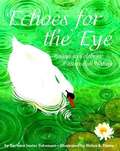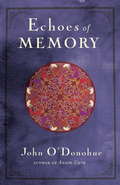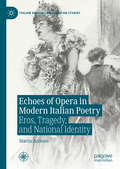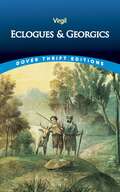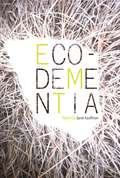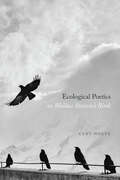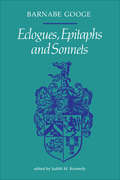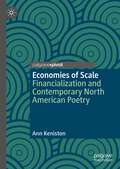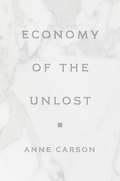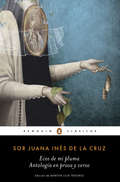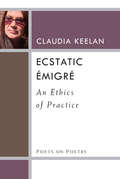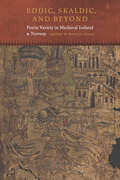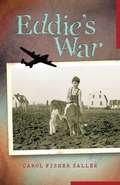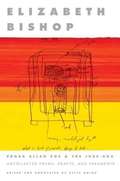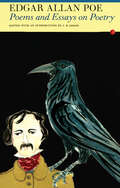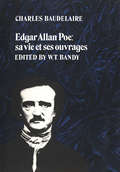- Table View
- List View
Eating Salad Drunk: Haikus for the Burnout Age by Comedy Greats
by Gabe Henry“I’m huge on Twitter.”—An ancient proverb that meansLonely in real life.—JOEL KIM BOOSTERJokes and haikus have a common goal: to pack the greatest punch in the most succinct way possible. In Eating Salad Drunk, today's biggest names in comedy come together to do just that, with hilarious, poignant, and (sometimes) dirty haikus about living and coping in our modern "burnout age." Contributors include Jerry Seinfeld, Michael Ian Black, Aubrey Plaza, Margaret Cho, Maria Bamford, Ray Romano, Aparna Nancherla, Ziwe Fumudoh, Chris Gethard, Sasheer Zamata, Colin Mochrie, Zach Woods, and many more! Curated by Gabe Henry, author and manager of the popular Brooklyn comedy venue Littlefield, Eating Salad Drunk's topics include:-Modern Romance-Friends & Family-Screentime-Nature Calls-Food -Entertainment-The Struggle is Real-Words of Wisdom, and-Self Love & LoathingThe book also includes 50 super-relatable black and white drawings by New Yorker cartoonist Emily Flake, as well as a foreword by stand-up comedian and actor Aparna Nancherla (Crashing, BoJack Horseman, Inside Amy Schumer).Eating Salad Drunk is the perfect gift for any fan of humor as an escape from our dystopian present.*All author proceeds go towards Comedy Gives Back, a nonprofit that provides mental health, medical, and crisis support resources for comedians.
Eating in the Underworld (Wesleyan Poetry Series)
by Rachel ZuckerIn Rachel Zucker’s re-imagining of the Greek myth, Persephone is a daughter struggling to become a woman. Unlike the classical portrait of a maiden kidnapped by a tyrant, Zucker’s Persephone chooses to travel to the Underworld and assume her role as Hades' queen. Caught between worlds—light and dark, innocence and power, a mother's protection and a lover's appeal—Persephone describes the strangeness of the Underworld and the problems of transformation and transgression. The arrangement of Zucker’s poems reflects Persephone’s travels between the Underworld and the Surface. Both spare and lyrical, they are written as entries in Persephone's diary and as letters between Persephone, Demeter, and Hades. The language—strange, urgent, direct—is pulled and changed as Persephone journeys from one world to another revealing the struggle of unmaking and remaking the self.
Eating the Honey of Words
by Robert BlyA Brilliant Collection Spanning Half A Century, From One Of America's Most Prominent And Powerful Poets Robert Bly has had many roles in his illustrious career. He is a chronicler and mentor of young poets, was a leader of the antiwar movement, founded the men's movement, and wrote the bestselling book Iron John, which brought the men's movement to the attention of the world. Throughout these activities, Bly has continued to deepen his own poetry, a vigorous voice in a period of more academic wordsmiths. Here he presents his favorite poems of the last decades-timeless classics from Silence in the Snowy Fields, The Man in the Black Coat Turns, and Loving a Woman in Two Worlds. A complete section of marelous new poems rounds out this collection, which offers a chance to reread, in a fresh setting, a lifetime of work dedicated to fresh perspectives. It is a brilliant collection that confirms Bly's role as one of America's preeminent poets writing today.
Eb & Flow
by Kelly J. BaptistA ten-day suspension has tweens De’Kari and Ebony seeing the world with a fresh perspective. Don’t miss this poignant novel in verse from the award-winning author of Isaiah Dunn Is My Hero. <P><P> Two kids. One fight. No one thinks they’re wrong. <p> Flow <br> I don’t even hit girls . . . is what I’m thinking. <br> I roll my eyes, turn them to my shoes. <br> Shoes I’ma wear every day till they fall off my feet. <p> Eb <br> It was all just an accident! <br> Nobody was trying to mess up <br> his Stupid Ugly Shoes. <br> Now I’ve got my third suspension of seventh grade. <P><P> Ebony and De’Kari (aka Flow) do not get along. How could they when their cafeteria scuffle ended with De’Kari’s ruined shoes, Ebony on the ground, and both of them with ten days of at-home suspension? Now Eb and Flow have two weeks to think about and explain their behavior—to their families, to each other, and ultimately to themselves. <P><P> Award-winning author Kelly J. Baptist delivers a novel in verse that follows Eb and Flow as they navigate their parallel lives. Single-parent homes, tight funds, and sibling dynamics provide a balancing act for the growing tweens. And whether they realize it or not, these two have a lot more in common than they think.
Echo Echo: Reverso Poems About Greek Myths
by Marilyn SingerA new book of unique reversible poems based on Greek myths from the creator of Mirror Mirror What happens when you hold up a mirror to poems about Greek myths? You get a brand-new perspective on the classics! And that is just what happens in Echo Echo, the newest collection of reverso poems from Marilyn Singer. Read one way, each poem tells the story of a familiar myth; but when read in reverse, the poems reveal a new point of view! Readers will delight in uncovering the dual points of view in well-known legends, including the stories of Pandora&’s box, King Midas and his golden touch, Perseus and Medusa, Pygmalion, Icarus and Daedalus, Demeter and Persephone, and Echo and Narcissus. These cunning verses combine with beautiful illustrations to create a collection of fourteen reverso poems to treasure.
Echo Of Moments: English Translation of Sindhi Poetry 'PAL PAL JO PARLAU'
by Hari DaryaniEcho of Moments is a collection of Poems, verses, songs and ghazals by Hari Daryani ‘Dilgir’ which are translated into English by Ram H. Daryani & Dr. Vinod Asudani
Echo and Critique: Poetry and the Clichés of Public Speech
by Florian GargailloIn Echo and Critique, Florian Gargaillo skillfully charts the ways that poets have responded to the clichés of public speech from the start of the Second World War to the present. Beginning around 1939, many public intellectuals on both sides of the Atlantic lamented that the political lexicon had become saturated with bureaucratic stock phrases such as “the fight for freedom,” “revenue enhancement,” and “service the target,” designed for the mass media and used to euphemize, obfuscate, and evade. Instead of ridding their writing of such language, many poets parroted these tropes as a means of exploring the implications of such expressions, weighing their effects, and identifying the realities they distort and suppress. With its attentiveness to linguistic particulars, poetry proved especially well-suited to this innovative mode of close listening and intertextual commentary. At the same time, postwar poets recognized their own susceptibility to dead language, so that co-opting political clichés obliged them to scrutinize their writing and accept the inevitability of cant while simultaneously pushing against it.This innovative study blends close readings with historical context as it traces the development of echo and critique in the work of seven poets who expertly deployed the method throughout their careers: W. H. Auden, Randall Jarrell, Langston Hughes, Claude McKay, Robert Lowell, Josephine Miles, and Seamus Heaney. Gargaillo’s analysis reveals that poetry can encourage us to listen diligently and critically to the insincerity ubiquitous in public discourse.
Echoes For The Eye: Poems To Celebrate Patterns In Nature
by Barbara J. EbensenA collection of poems that reveal patterns in nature.
Echoes inside the Labyrinth
by Thomas McgrathA collection of poems of various incidents that took place from time to time dating back to the historic period.
Echoes of Memory
by John O'DonohueJohn O'Donohue won hundreds of thousands of admirers with his now classic work on Celtic spirituality, Anam Cara. Just as To Bless the Space Between Us was being published, he died suddenly at the age of fifty-two. His powerfully wise and lyrical voice is profoundly missed, but his many readers are now given a special opportunity to revisit John in his first book, a collection of poetry. O'Donohue's readers know him as both a spiritual guide and a poet. In the same spirit as his bestselling works, readers will be inspired yet again by John's depth of wisdom and artistry.
Echoes of Opera in Modern Italian Poetry: Eros, Tragedy, and National Identity (Italian and Italian American Studies)
by Mattia AcetosoTwentieth-century Italian poetry is haunted by countless ghosts and shadows from opera. Echoes of Opera in Modern Italian Poetry reveals their presence and sheds light on their role in shaping that great poetic tradition. This is the first work in English to analyze the influence of opera on modern Italian poetry, uncovering a fundamental but neglected relationship between the two art forms. A group of Italian poets, from Gabriele D’Annunzio to Giorgio Caproni, by way of Umberto Saba and Eugenio Montale, made opera a cornerstone of their artistic craft. More than an occasional stylistic influence, opera is rather analyzed as a fundamental facet of these poets’ intellectual quest to overcome the expressive limitations of lyrical poetry. This book reframes modern Italian poetry in a truly interdisciplinary perspective, broadening our understanding of its prominence within the humanities, in the twentieth century and beyond.
Eclogues and Georgics
by VirgilWith the Eclogues, Virgil established his reputation as a major poet, and with the Georgics, he created a masterpiece of Latin poetry. Virgil drew upon the tradition of Greek pastoral poetry, importing it into an Italian setting and providing in these two works the model for subsequent European interpretations of the genre.The Eclogues unfolds in an idyllic landscape, under less-than-tranquil circumstances. Its shepherds tend their flocks amid not only the inner turmoil of unrequited love but also the external pressures of the civil war that followed Julius Caesar's assassination in 44 B.C. Forced from their homes, the dispossessed shepherds voice a heartfelt longing for peace.Dryden declared the Georgics "the best poem by the best poet," and through the ages, it has been much admired and imitated. A paean to Italy and the country's natural beauty, it rejoices in the values of rustic piety, the pleasures of family life, and the vitality of the Italian people.
Eco-dementia
by Janet KauffmanJanet Kauffman describes “eco-dementia” as a paradoxical condition of humanity—a love of the living world while simultaneously causing and suffering from its destruction. Like other dementias, losses are profound. We lose touch, we forget. We don’t recognize our own home—the habitat that sustains us. What has driven us to exploit more and more resources, even when risking self-annihilation? Eco-dementia is not nature poetry, but an immersive language in the tangle of the living world that begs the question: can we survive this relationship? The poems in Eco-dementia took shape in one decade of the author’s life. In three sections, Kauffman reflects on insanities and devastations, from the personal to the global. From her father’s Alzheimer’s and the ravaged world of his mind to the horrors of Abu Ghraib, Hurricane Katrina, and toxins in Lake Erie, as well as the planetary-wide ecological catastrophe of climate change. Yet despite this devastation, it is possible to surround ourselves in light and air, to touch the tall grasses we love, to step into water and shade and feel an intense, momentary joy. Kauffman’s poems show the bliss within the elemental richness of the natural world and also the violent distortions and grief at its devastation. Like learning a new language, we can see and hear words, sometimes understanding so clearly and other times not at all. Or as Kauffman’s father puts it, “I know where you live, but I don’t know who you are.” The language of these poems is the physical material of a damaged world. Readers of modern and experimental poetry will treasure this collection.
Ecocriticism in the Modernist Imagination
by Kelly SultzbachAlthough modernism has traditionally been considered an art of cities, Ecocriticism in the Modernist Imagination claims a significant role for modernist texts in shaping environmental consciousness. Analyzing both canonical and lesser-known works of three key figures - E. M. Forster, Virginia Woolf, and W. H. Auden - Sultzbach suggests how the signal techniques of modernism encourage readers to become more responsive to the animate world and non-human minds. Understanding the way these writers represent nature's agency becomes central to interpreting the power dynamics of empire and gender, as well as experiments with language and creativity. The book acknowledges the longer pastoral tradition in literature, but also introduces readers to the newly expanding field of ecocriticism, including philosophies of embodiment and matter, queer ecocriticism, and animal studies. What emerges is a picture of green modernism that reifies our burgeoning awareness of what it means to be human within a larger living community.
Ecological Poetics; or, Wallace Stevens’s Birds
by Cary WolfeThe poems of Wallace Stevens teem with birds: grackles, warblers, doves, swans, nightingales, owls, peacocks, and one famous blackbird who summons thirteen ways of looking. What do Stevens’s evocations of birds, and his poems more generally, tell us about the relationship between human and nonhuman? In this book, the noted theorist of posthumanism Cary Wolfe argues for a philosophical and theoretical reinvention of ecological poetics, using Stevens as a test case. Stevens, Wolfe argues, is an ecological poet in the sense that his places, worlds, and environments are co-created by the life forms that inhabit them. Wolfe argues for a “nonrepresentational” conception of ecopoetics, showing how Stevens’s poems reward study alongside theories of system, environment, and observation derived from a multitude of sources, from Ralph Waldo Emerson and Niklas Luhmann to Jacques Derrida and Stuart Kauffman. Ecological Poetics is an ambitious interdisciplinary undertaking involving literary criticism, contemporary philosophy, and theoretical biology.
Ecologues, Epitaphs and Sonnets
by Barnabe Googe Judith KennedyWhen at the age of twenty-three Barnabe Googe allowed the publication of his Ecologues, Epitaphs, and Sonnets, he became the first English author to publish personal poetry during his lifetime. His ecologues are, with Barclay's, the first examples of the form in English, anticipating in several respects Spenser's Shepheardes Calendar. He was the first writer to introduce into English literature Montemayor's pastoral romance Diana, later an important source for Sidney, Spenser, and Shakespeare. His short lyrics, many of them occasional, provides an image of the society of the time, and have been admired by modern critics as representative of the native plain style. The small volume of 1563 was last edited by Edward Arber in 1871. In this new edition Judith Kennedy offers a modernized text, with introduction, commentary, and textual apparatus. The volume has been designed for students with little knowledge of the period, offering them a readable text and inviting investigation into other aspects of the period and the ways in which it relates to later Elizabethan literature. For scholars, the textual appendix provides the necessary assurances of the reliability of the text; the network of literary and personal associations explored in the introduction and notes will also be of considerable interest.
Economies of Scale: Financialization and Contemporary North American Poetry (Palgrave Studies in Literature, Culture and Economics)
by Ann KenistonThis book offers the first sustained study of the ways 21st century North American poems engage with financialization. It argues that recent poems about economics not only discuss but enact concerns with containment and agency essential to the contemporary financialized economy by manipulating the seemingly old-fashioned figures of synecdoche (the representation of the whole by the part) and prosopopeia or personification. Its four body chapters offer in-depth readings of the work of eleven formally, culturally, and thematically diverse contemporary U.S. and Canadian poets who variously consider labor, consumerism, debt, and the derivative form; the Coda reads several recent poems about reparations in terms of an emerging tendency to emphasize the historical, racialized, and ethical contexts of contemporary economics. As the book explores financialization’s representation in recent poetry, it redresses arguments that poetry is irrelevant to contemporary culture.
Economy of the Unlost: (Reading Simonides of Keos with Paul Celan) (Martin Classical Lectures #14)
by Anne CarsonThe ancient Greek lyric poet Simonides of Keos was the first poet in the Western tradition to take money for poetic composition. From this starting point, Anne Carson launches an exploration, poetic in its own right, of the idea of poetic economy. She offers a reading of certain of Simonides' texts and aligns these with writings of the modern Romanian poet Paul Celan, a Jew and survivor of the Holocaust, whose "economies" of language are notorious. Asking such questions as, What is lost when words are wasted? and Who profits when words are saved? Carson reveals the two poets' striking commonalities. In Carson's view Simonides and Celan share a similar mentality or disposition toward the world, language and the work of the poet. Economy of the Unlost begins by showing how each of the two poets stands in a state of alienation between two worlds. In Simonides' case, the gift economy of fifth-century b.c. Greece was giving way to one based on money and commodities, while Celan's life spanned pre- and post-Holocaust worlds, and he himself, writing in German, became estranged from his native language. Carson goes on to consider various aspects of the two poets' techniques for coming to grips with the invisible through the visible world. A focus on the genre of the epitaph grants insights into the kinds of exchange the poets envision between the living and the dead. Assessing the impact on Simonidean composition of the material fact of inscription on stone, Carson suggests that a need for brevity influenced the exactitude and clarity of Simonides' style, and proposes a comparison with Celan's interest in the "negative design" of printmaking: both poets, though in different ways, employ a kind of negative image making, cutting away all that is superfluous. This book's juxtaposition of the two poets illuminates their differences--Simonides' fundamental faith in the power of the word, Celan's ultimate despair--as well as their similarities; it provides fertile ground for the virtuosic interplay of Carson's scholarship and her poetic sensibility.
Ecos de mi pluma: Antología en prosa y verso
by Sor Juana de la Cruz«Pero valor, corazón: porque en tan dulce tormento, en medio de cualquier suerte no dejar de amar protesto» Sor Juana Inés de la Cruz es una de las poetas más importantes de la lengua española. Cierra con broche de oro el Barroco hispánico y es, además, una figura muy seductora: mujer, monja, sabia, defensora de la capacidad intelectual de las mujeres. Sin embargo, como todo autor célebre, sor Juana ha sido víctima de su fama: todo mundo la conoce, pero muy pocos la leen. Esta antología presenta una selección representativa de su obra, cuidadosamente puntuada y anotada, para acercarla a cualquier tipo de lector. Como novedad se incluyen, por primera vez juntas, la Carta de sor Juana a su confesor, el padre Núñez, y la Respuesta a sor Filotea de la Cruz, dirigida al obispo de Puebla, atinadamente comentadas por la editora: Martha Lilia Tenorio, especialista en poesía barroca, dedicada a recuperar buena parte del acervo lírico de Nueva España. Edición, prólogo, notas y cronología de MARTHA LILIA TENORIO.
Ecstatic Émigré: An Ethics of Practice
by Claudia KeelanMost think of an émigré as one who leaves her native land to find home in another. Claudia Keelan, in essays both personal and critical, enlists poetic company for her journey, engaging both canonical and common figures, from Gertrude Stein to a prophetic Las Vegas cab driver named Caesar. Mapping her own peripatetic evolution in poetry and her nomadic life, she also engages with Christian and Buddhist doctrines on the virtues of dispossession. ? Ecstatic Émigré pays homage to poets from Thoreau and Whitman to Alice Notley, all of whom share a commitment to living and writing in the moment. Keelan asks the same questions about the growth of flowers or the meaning of bioluminescence as she does about the poetics of John Cage or George Oppen. Her originality is grounded by the ways in which she connects poetic principles with the spiritual concepts of via negativa demonstrated both in St. John of the Cross and Mahayana Buddhism. In addition, her essays demonstrate an activist spirit and share a commitment to the passive resistance demonstrated in Martin Luther King, Jr.’s concept of the “beloved community” and philosopher Simone Weil’s dedication to “exile.”
Eddic, Skaldic, and Beyond: Poetic Variety in Medieval Iceland and Norway (Fordham Series in Medieval Studies)
by Martin ChaseEddic, Skaldic, and Beyond shines light on traditional divisions of Old Norse–Icelandic poetry and awakens the reader to work that blurs these boundaries. Many of the texts and topics taken up in these enlightening essays have been difficult to categorize and have consequently been overlooked or undervalued. The boundaries between genres (Eddic and Skaldic), periods (Viking Age, medieval, early modern), or cultures (Icelandic, Scandinavian, English, Continental) may not have been as sharp in the eyes and ears of contemporary authors and audiences as they are in our own. When questions of classification are allowed to fade into the background, at least temporarily, the poetry can be appreciated on its own terms. Some of the essays in this collection present new material, while others challenge long-held assumptions. They reflect the idea that poetry with “medieval” characteristics continued to be produced in Iceland well past the fifteenth century, and even beyond the Protestant Reformation in Iceland (1550). This superb volume, rich in up-to-date scholarship, makes little-known material accessible to a wide audience.
Eddie's War
by Carol SallerWorld War II. Hitler is threatening to take over the world. Eddie Carl thinks America should stop him—it’s just plain right. But Eddie’s just a kid, and the farm in Ellisville, Illinois, is a long way from the fighting. <P><P>Ellisville: where the big news stories are gophers in the graveyard and the new bank alarm. But then America joins the war and Eddie’s brother Thomas goes off to fly a bomber. Suddenly the war doesn’t seem so far away. And Eddie faces more grown-up problems at home: A fire at the Strothers’ place, and his gypsy friend accused of arson. Grampa Rob, all stubborn and mean. Grama Lucy with her secrets. And that redhead Sarah, who definitely likes him—unless maybe she hates him. Somehow Eddie’s in the middle of it all, trying to figure out what’s right. Let Thomas fight World War II. Eddie’s war is right here in Ellisville. <P><P>Eddie’s War is a lyrical collection of prose vignettes linking Eddie, his family, and a small-town cast of Ellisvillians. Poignant and funny, this World War II story tells how a distant war affects the life of one boy in the Heartland.
Edgar Allan Poe and the Juke-box: Uncollected Poems, Drafts, and Fragments
by Elizabeth BishopFrom the mid-1930s to 1978 Elizabeth Bishop published some eighty poems and thirty translations. Yet her notebooks reveal that she embarked upon many more compositions, some existing in only fragmentary form and some embodied in extensive drafts. Edgar Allen Poe & The Juke-Box presents, alongside facsimiles of many notebook pages from which they are drawn, poems Bishop began soon after college, reflecting her passion for Elizabethan verse and surrealist technique; love poems and dream fragments from the 1940s; poems about her Canadian childhood; and many other works that heretofore have been quoted almost exclusively in biographical and critical studies. This revelatory and moving selection brings us into the poet's laboratory, showing us the initial provocative images that moved her to begin a poem, illustrating terrain unexplored in the work published during her lifetime. Editor Alice Quinn has also mined the Bishop archives for rich tangential material that illuminates the poet's sources and intentions.
Edgar Allan Poe: Selected Poems and Essays
by Edgar Allan PoeHis reputation has never settled, seeing as many reversals after his death as during his life. Though read and enjoyed ny many, fewer admire him openly. This volume includes all of his poetry and his most important essays.
Edgar Allan Poe: sa vie et ses ouvrages
by Charles Baudelaire W. T. BandyThe earliest foreign study of the life and works of Edgar Allan Poe, the text presented in this volume is something of a landmark in the history of comparative literature. Baudelaire's first and longest essay on Poe was published in the Revue de Paris is 1852; it was revised and abridged for use as the preface of the first volume of his translation of Poe's tales, Histoires extraordinaires. This study was significant especially in the area of Franco-American literary relations because it was the basis of not only the French attitude toward Poe, but of his reputation throughout Europe--one might almost say, throughout the world. The essay on Poe has never been the subject of a separate publication. This edition reveals for the first time the sources of information used by Baudelaire. It shows that a considerable part of the study was translated literally from articles by John M. Daniel and John R. Thompson in the Southern Literary Messenger (1849-50). Previous editions vary widely in excellence because almost all suffered from the mistaken belief that Baudelaire was acquainted with the American edition of Poe's works when he wrote the 1852 essay and that it was largely based on Rufus Griswold's Memoir contained in that edition. This led to the commentary and notes that were unconsciously misleading and in many cases false.The introduction to this edition presents a complete and accurate account of the genesis of Baudelaire's essay, with supporting documents showing his indebtedness to American, French, and British sources. It enables the reader to distinguish clearly between what Baudelaire himself knew or thought about Poe and what he borrowed from other writers.
